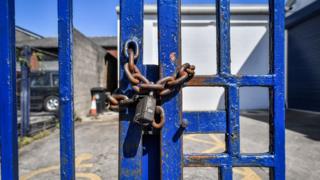Coronavirus lockdown: Business group calls for phased easing

Image copyright
PA Media
Ministers should immediately set out plans for a “carefully phased” lifting of the UK’s coronavirus lockdown, a business group has said.
“This is a time to be bold,” said the British Chambers of Commerce, adding high public spending should continue if needed to restart the economy.
Boris Johnson has said he will outline plans relating to schools, commuting and the workplace in the coming week.
But the PM stressed the UK must not “risk a second spike” in infections.
Transport secretary Grant Shapps told the BBC that businesses could be asked to stagger employees working hours, once lockdown eases, to help prevent crowding on public transport.
“There are a series of different things that we can do including staggering work times, and we’re working with businesses and organisations to do that,” he said.
The British Chambers of Commerce (BCC) said business groups and major employers expect to receive draft guidance from the government on Sunday about the safe return to work when the lockdown eases.
In a letter to Mr Johnson, BCC president Baroness Ruby McGregor-Smith said planning and communication of the government’s approach to leaving lockdown “must begin immediately if we are to harness the public health and economic benefits”.
“Fundamental prerequisites to beginning this journey include mass testing and contact tracing,” she writes.
The BCC’s director general Adam Marshall also said that businesses need to be given adequate time to prepare to reopen.
He told BBC Breakfast: “A number of firms need a couple of weeks or possibly even longer in order to prepare to reopen their operations.
“I think they understand that of course public health considerations have to come first and the government may have to make changes to that plan as we go but they need to start seeing some timeframes for reopening and that will give them the confidence to get ready.”
Baroness McGregor-Smith also calls for “clear decisions and guidance” on the protective kit employees should wear in workplaces, as well as steps to ensure adequate supply to both the NHS and businesses, where necessary.
The government has set out five tests to be met before lockdown restrictions can be eased, including:
- making sure the NHS can cope
- a “sustained and consistent” fall in the daily death rate
- rate of infection decreasing to “manageable levels”
- ensuring supply of tests and personal protective equipment can meet future demand
- being confident any adjustments would not risk a second peak “that overwhelms the NHS”
‘Cash crunch’
Since the pandemic hit the UK, Chancellor Rishi Sunak has announced tens of billions of pounds in emergency support aimed at helping businesses and saving jobs.
A job retention scheme in which the government covers 80% of workers’ wages, up to a maximum of £2,500 per worker, per month before tax, received applications from 185,000 firms on the day it launched last month.
And the number of people applying for universal credit benefits has rocketed during the lockdown.
Analysis
By Katy Austin, business correspondent
Companies feeling the hit from the shutdown are starting to accept that a reopened economy will not be “business as usual”.
But they want to know when and how they can get going again.
Elizabeth and Phil Gabriel own a health club near Nottingham. They have furloughed staff, benefitted from a cash grant and been able to defer VAT payments. But fixed costs continue and cash will run out if they have to close for four months or more.
Health club owners Elizabeth and Phil Gabriel want clarity on how businesses will reopen
They are asking for decent notice of re-opening dates, and clear guidance on how many customers – especially those who are older – will be allowed in at once.
Then there’s office-based firms. David Morel runs Tiger Recruitment. His staff are currently either working from home or on furlough. While he waits for clarity from government, he’s considering a range of options for safe office working.
There will be different dilemmas for different industries. Hospitality businesses, for example, such as restaurants are trying to work out how they can make enough money to survive with new layouts that probably mean fewer customers.
Mr Marshall said that the government needs to extend its various support schemes to help businesses survive.
“Unfortunately quite a lot of firms are facing a very serious cash crunch,” he said. “Many businesses have been able to hold on through the period of lockdown [but] some unfortunately won’t be able to last very long which is why we need to see an extension to the government support schemes that are in place.
“So the furlough scheme, for example, is going to have to be extended and become more flexible to help more firms survive over the coming months and avoid some of the mass redundancies that none of us want to see.”
In her letter, Baroness McGregor-Smith urges the prime minister to act further to minimise job losses and business failures, putting the UK economy on a “high-growth, high-wage and low unemployment trajectory” as soon as possible.
“Government should not shy away from sustaining high levels of public spending in order to restart and renew our communities and the economy in the short and medium-term, while not tying the hands of future generations,” she says.

